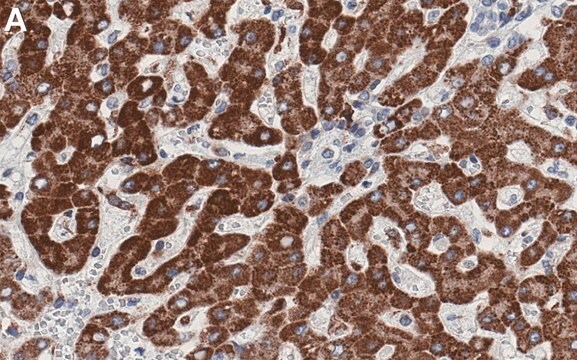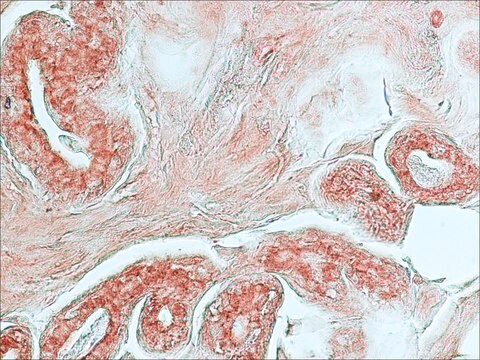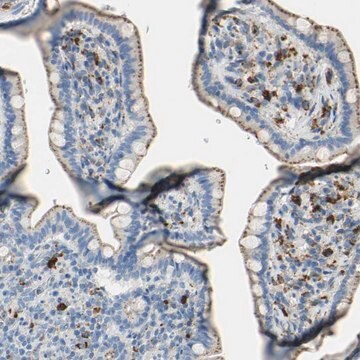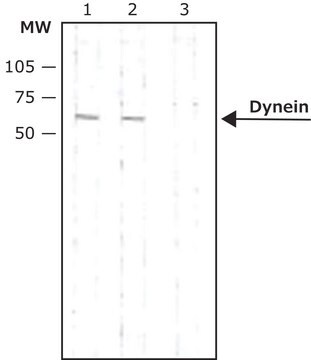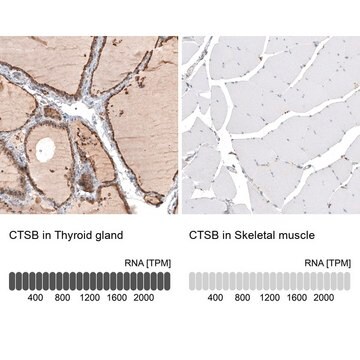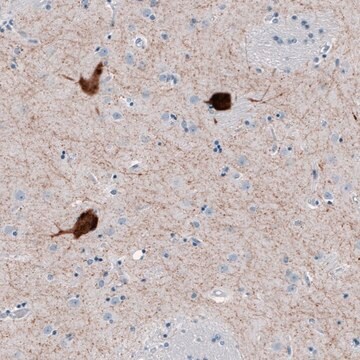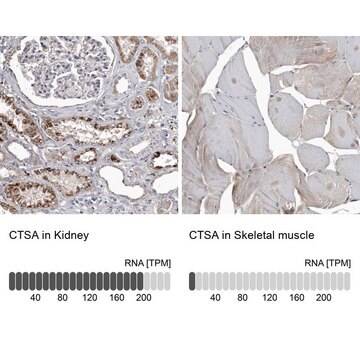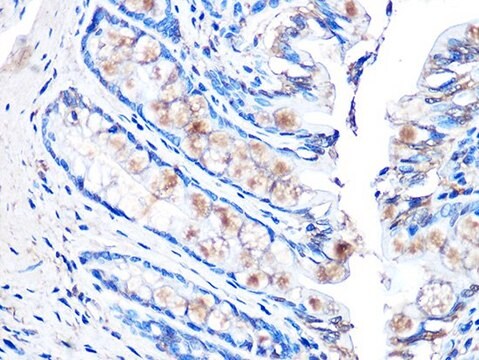추천 제품
생물학적 소스
mouse
Quality Level
항체 형태
purified from hybridoma cell culture
항체 생산 유형
primary antibodies
클론
CTD-19, monoclonal
양식
buffered aqueous solution
종 반응성
human, rabbit
농도
~1.0 mg/mL
기술
immunoblotting: 2-4 μg/mL using human breast cancer MCF7 cell line
immunofluorescence: 5-10 μg/mL using HeLa cells
immunohistochemistry: 10-20 μg/mL using heat-retrieved formalin-fixed, paraffin-embedded human liver sections
동형
IgG2a
UniProt 수납 번호
배송 상태
dry ice
저장 온도
−20°C
타겟 번역 후 변형
unmodified
유전자 정보
human ... CTSD(1509)
일반 설명
Anti-Cathepsin D antibody, Mouse monoclonal (mouse IgG2a isotype) is derived from the CTD-19 hybridoma, produced by the fusion of mouse myeloma cells and splenocytes from BALB/c mouse immunized with cathepsin D purified from human liver. Cathepsin D (CatD or CTSD) is synthesized in the rough endoplasmic reticulum as pre-proprotein. After removal of signal peptide, the pro-CatD is targeted to endosomes to form an active, ~48 kDa, single-chain intermediate then to the lysosomes to form the fully active mature protease, composed of a ~30 kDa heavy chain and a ~14 kDa light chain.
면역원
Cathepsin D Purified from human liver
애플리케이션
Anti-Cathepsin D antibody, Mouse monoclonal has been used in:
- immunoblotting
- immunohistochemistry
- immunofluorescence
생화학적/생리학적 작용
CatD plays numerous physiological functions in the cells including metabolic degradation of intracellular proteins and the activation of enzymatic precursors. In the central nervous system, CatD is particularly important for the control of neuronal homeostasis, cell migration and interneuron communication. CatD-mediated proteolysis mediates the degradation of unfolded/oxidized protein aggregates in lysosome. The level of CatD synthesized by the cells is increased in response to mitogenic signals from estrogen, epidermal growth factor (EGF), fibroblast growth factor (FGF), and insulin like growth factor-I (IGF- I). The ability of tumor cells to invade the extracellular matrix has been attributed to cathepsins released by tumor cells or associated with its plasma membrane.
물리적 형태
Solution in 0.01 M phosphate buffered saline, pH 7.4, containing 15 mM sodium azide.
적합한 제품을 찾을 수 없으신가요?
당사의 제품 선택기 도구.을(를) 시도해 보세요.
Storage Class Code
10 - Combustible liquids
Flash Point (°F)
Not applicable
Flash Point (°C)
Not applicable
M J Duffy et al.
Clinical chemistry, 37(1), 101-104 (1991-01-01)
Cathepsin D (CD, EC 3.4.23.5) is a lysosomal protease induced by estrogen in certain estrogen receptor (ER)-positive breast cancer cell lines but produced constitutively by ER-negative cell lines. Our aims in this investigation were to study the distribution of CD
Nuclear cathepsin D enhances TRPS1 transcriptional repressor function to regulate cell cycle progression and transformation in human breast cancer cells
Bach AS, et al.
Oncotarget, 6(29), 28084-28084 (2015)
Cathepsin D as a therapeutic target in Alzheimer's disease.
Di Domenico F, et al.
Expert Opinion on Therapeutic Targets, 20(12), 1393-1395 (2016)
The role of cathepsin D in the pathogenesis of human neurodegenerative disorders
Vidoni C, et al.
Medicinal Research Reviews, 36(5), 845-870 (2016)
Veronika Stoka et al.
Ageing research reviews, 32, 22-37 (2016-04-30)
Lysosomes and lysosomal hydrolases, including the cathepsins, have been shown to change their properties with aging brain a long time ago, although their function was not really understood. The first biochemical and clinical studies were followed by a major expansion
자사의 과학자팀은 생명 과학, 재료 과학, 화학 합성, 크로마토그래피, 분석 및 기타 많은 영역을 포함한 모든 과학 분야에 경험이 있습니다..
고객지원팀으로 연락바랍니다.